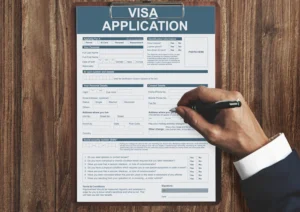In 2022, over 39,000 people immigrated to Scotland from other parts of the world excluding the UK, and many people are still looking for ways how to immigrate to Scotland.
Immigrating to Scotland, like any other country, requires meeting certain eligibility criteria and following specific procedures, but that shouldn’t be a problem as I will be guiding you down the path of how to immigrate to Scotland, a nation renowned for its whisky distilleries, bagpipes, vibrant music scene, and stunning lochs.
Is Scotland a welcoming place for immigrants?

Is Scotland a welcoming place for immigrants
Before you begin to think of moving permanently to a new country that you know nothing about, you must first be able to determine if it is suitable for you as an immigrant.
Scotland is generally considered to be a welcoming place for immigrants. The country has a diverse population and a history of welcoming people from other countries. Scotland has a publicly funded healthcare system and a strong education system.
There are also various support services available for immigrants, including language classes and help with finding housing and employment.
Additionally, the Scottish government has stated its commitment to promoting an inclusive society and has taken steps to ensure that immigrants are able to integrate and participate fully in Scottish society.
How To immigrate To Scotland
To immigrate to Scotland, you will need to meet certain criteria set by the UK government and have the necessary documents and information. These may include:
Apply for a visa

Apply for a visa
How to immigrate to Scotland can be a very easy process, And if you are a citizen of a country outside the European Economic Area (EEA) or Switzerland, you will need to apply for a UK visa before moving to Scotland. To apply for a UK visa, you will need to determine the appropriate visa category for your situation and then complete the online visa application.
The most common visa categories for immigrating to Scotland are the Tier 2 (General) visa for skilled workers, the Tier 1 (Entrepreneur) visa for business owners, and the Tier 1 (Investor) visa for investors. You can also apply for a family visa if you are married or in a long-term relationship with a UK citizen or someone who has settled status in the UK.
When applying for a UK visa, you will need to provide documentation such as a valid passport, proof of financial support, and a certificate of sponsorship from a UK employer (if applicable). You may also need to attend a visa interview and provide biometric information.
Apply for settled status

Apply for settled status
To apply for settled status in relation to immigration to Scotland, you must first have been living in the UK continuously for five or more years. If this is the case, you will be eligible to apply for “settled status” under the EU Settlement Scheme. This will allow you to remain in the UK permanently and access the same rights and entitlements as those who hold British citizenship.
You can apply for the EU Settlement Scheme through the Home Office and will need to provide evidence of your identity, residence in the UK, and criminal records. Once your application has been approved, you will receive an immigration status document providing proof of your settled status.
If you are an EU, EEA, or Swiss citizen and your family members living in Scotland before the end of December 2020, you can apply for settled status through the Scottish Government’s EU Settlement Scheme.
Apply for citizenship

Apply for citizenship
If you have been living in Scotland for at least five years, you may be eligible to apply for Scottish citizenship. To apply for citizenship in relation to immigrating to Scotland, you would need to first meet the requirements for becoming a legal permanent resident (commonly referred to as obtaining a “green card”) in the United Kingdom.
Once you have fulfilled the requirements for permanent residence, you can apply for naturalization as a British citizen. This process typically involves taking a test on life in the UK and passing an English language test, as well as meeting the good character requirement.
Additionally, you may need to have been living in the UK for a certain period of time before you can apply for citizenship. It is important to note that the process for immigration and citizenship can vary depending on your individual circumstances and your country of origin,
Steps On How To Immigrate To Scotland
To immigrate to Scotland, you will need to follow the steps outlined below:
- Determine which category of visa you fall under. Scotland offers various types of visas such as work visas, study visas, family visas, and more.
- Gather the necessary documents and information. This may include proof of income, education, and language proficiency, depending on the visa category you are applying for.
- Submit your application online through the UK government website or at a visa application center.
- If required, attend an interview or provide biometric information.
- Wait for a decision on your application. Processing times vary depending on the visa category and the volume of applications.
- Once your visa is approved, make sure to keep your passport and other documentation in a safe place and inform the relevant authorities of any changes to your details.
FAQ On How To Immigrate To Scotland
Does Scotland give citizenship to foreigners?
It will also be possible for citizens of any nation who have lived in Scotland for at least ten years and maintain ties to the country to apply for naturalization. This is a brand-new category that does not have a counterpart in British nationality law at the moment.
Do I need a visa to immigrate to Scotland?
Yes, depending on your nationality and the purpose of your visit, you may need to apply for a visa before traveling to Scotland.
If you are a citizen of the European Union, European Economic Area, or Switzerland, you have the right to live and work in Scotland without a visa.
If you are a citizen of a country outside of the EU, you may need a visa to immigrate to Scotland. The type of visa you will need will depend on the length of your stay and the purpose of your visit.
Summary
This content has provided a way out for you if you were eager to learn how to immigrate to Scotland or if you needed to help out a friend or family member. As you have already read, don’t let it escape your memory that you will have to apply for a visa, permanent resident status, and citizenship.







Leave a Comment